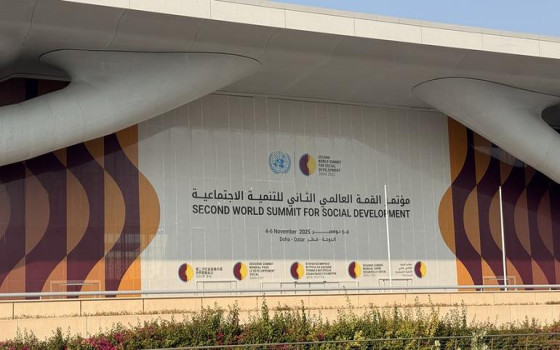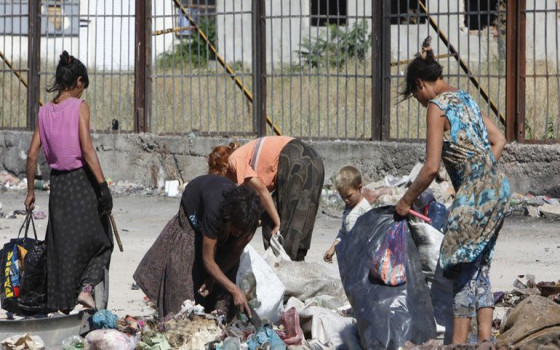Global Alliance Meets in Doha to Address Hunger Crisis: 670 Million People Affected, Over 2 Billion Face Food Insecurity

- Europe and Arabs
- Tuesday , 4 November 2025 9:18 AM GMT
Doha: Europe and the Arabs
With hunger on the rise globally and millions struggling to secure their next meal, world leaders gathered in Doha on Monday for the inaugural high-level meeting of the Global Alliance Against Hunger and Poverty.
Addressing heads of state, ministers, and international partners, UN General Assembly President Annalena Baerbock stated that the hunger crisis facing the world today is not a result of scarcity, but rather a product of inequality, conflict, and political choices.
Last year, more than 670 million people suffered from hunger, and 2.3 billion faced moderate or severe food insecurity. She said, "This means billions of people wondering where their next meal will come from. Parents having to watch their children go to bed hungry." This is happening in a world where more than a billion meals are wasted every day.
She added, "The hunger crisis is not a lack of food. It is entirely preventable," pointing to failures in access, affordability, and social protection. The meeting took place as Doha hosted the second World Social Development Summit, where nearly 14,000 participants discussed how to strengthen social systems, expand opportunities, and reduce inequality.
As the planet warms, hunger spreads.
Ms. Baerbock highlighted climate change as an accelerating driver of hunger. She recalled a recent visit to the Sahel region, where she described fertile land turning to dust as temperatures soared and rainy seasons failed. “This is the new front line of food insecurity,” she said.
She warned that if global warming continues unchecked, up to 1.8 billion more people could face food insecurity. But limiting warming to 1.5 degrees Celsius, supported by investment in adaptation and resilience, could prevent millions from sinking deeper into poverty.
The Global Alliance Against Hunger and Poverty was launched under Brazil’s G20 presidency in 2024 and now has nearly 200 members—more than 100 countries, regional organizations, international agencies, and civil society groups. Monday’s meeting was the first at the leaders’ level and aimed to accelerate practical cooperation, from expanding social protection to promoting climate-resilient agriculture.
“In a world of plenty—where there should be enough for everyone—ensuring that everyone, everywhere, has enough to eat is entirely possible,” said Baerbock.
“A world free from hunger and poverty is not a distant dream. It is within our grasp, if we work together to achieve it,” she concluded.
In an interview with UN News, Rania Dakash, Assistant Executive Director of the World Food Programme, said that the program assisted some 124 million people worldwide in 2024, particularly in conflict zones and fragile areas where people are in dire need.
She explained that some 300 million people are currently affected by hunger. She continued, "At the World Food Programme, we support school feeding programs. Currently, more than 400 million children worldwide receive school meals, which helps them absorb lessons and continue their education, especially for girls. These school meals are the backbone of the fight against hunger."
The UN official stated that the summit discussions would focus on solutions and ideas to address major problems such as poverty, hunger, unemployment, and inequality.
She noted that the World Food Programme is working with governments in more than 63 countries to build social protection systems to reduce vulnerability in many regions.
She concluded with a message: "Every individual, every company, and every government has a role to play in reducing hunger and poverty in the world. Speak out about hunger because it is a major problem affecting millions of people. Support governments so they can build systems that reduce vulnerability worldwide." Heads of state and government, ministers, civil society leaders, youth delegates, workers, and private sector representatives will participate in plenary sessions, high-level roundtables, and parallel forums focusing on social protection, inequality, decent work, and the inclusion of marginalized groups.
UN Spokesperson Stéphane Dujarric confirmed that Secretary-General António Guterres will deliver a speech at the opening ceremony on Tuesday.
He will highlight the progress made since the first World Social Summit in Copenhagen in 1995, while also emphasizing major global challenges, including widening inequalities, unemployment, poverty, conflict, and widespread human suffering.
While in Doha, the Secretary-General will also participate in a side event on education and hold bilateral meetings with senior officials. According to the UN Daily News, the idea that development should be human-centered, inclusive, and equitable is not new. It is a vision the world committed to 30 years ago at the UN summit in Copenhagen, and its echoes still resonate today.
Leaders from around the world are gathering in Doha, Qatar, from November 4 to 6, to assess progress, address persistent gaps, and chart a new course forward.
At the heart of the meetings lies a simple yet powerful question: How can we ensure that no one is left behind?
Lee Junhwa, UN Under-Secretary-General for Economic and Social Affairs, said the summit comes at a critical juncture. “Inequalities are widening, trust is eroding, and societies are struggling with conflict, climate shocks, and rapid technological change,” he said. “Yet we are also witnessing extraordinary innovation, resilience, and solidarity. This is our opportunity to rebuild trust between governments and their people, and between nations.”














No Comments Found